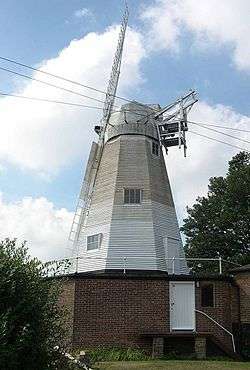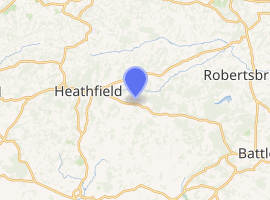Blackdown Mill, Punnetts Town
Blackdown Mill or Cherry Clack Mill is a grade II listed[1] smock mill at Punnetts Town, East Sussex, England, which has been restored.
| Punnetts Town Windmill | |
|---|---|
 The mill in 2006 | |

| |
| Origin | |
| Mill name | Punnett's Town Mill Cherry Clack Mill |
| Mill location | TQ 627 209 |
| Coordinates | 50°57′54″N 0°18′58″E |
| Operator(s) | Private |
| Year built | 1859 |
| Information | |
| Purpose | Corn mill |
| Type | Smock mill |
| Storeys | Three-storey smock |
| Base storeys | Single-storey base |
| Smock sides | Eight sides |
| No. of sails | Four Sails (Two Missing) |
| Type of sails | Common sails |
| Windshaft | Cast iron |
| Winding | Fantail |
| Fantail blades | Six blades |
| Auxiliary power | Engine |
| No. of pairs of millstones | Two pairs, a third pair driven by engine |
History
Blackdown Mill, was originally built at Three Chimneys, Cranbrook, Kent. She was dismantled and moved to Punnetts Town[2] in 1859 to replace a post mill that had burnt down.[3] The original mill was referred to as Cherry Clack Mill in the 1851 census, when Demas Dallaway was the miller.[4] The move was done by Neve's, the Heathfield millwrights.[5] The mill was working by wind until the 1920s,[6] when the mill became unable to turn to wind because of a broken curb. The mill was stripped of machinery and the cap and sails removed by Neve's in 1933.[3]
In 1946, Archie Dallaway decided to restore the mill back to working order. A new cap, of a different design to the original was built. A new fantail fitted, and the windshaft from Staplecross Mill, which was demolished in 1951, was installed.[3] Four new sails were made and fitted in 1972. Two pairs of millstones were installed, one pair coming from a watermill at Polegate.[5] A third pair of stones was added later.[3]
Description
Blackdown Mill is a three-storey smock mill on a single-storey brick base. It originally had Kentish-style cap, winded by a fantail. When last working for trade she had four patent sails. The mill drove two pairs of overdrift millstones, with a third pair worked by engine. A saw was also worked by the mill.[3]
As restored, a beehive cap clad in aluminium is now carried, and the sails are now common sails. The sails are 26-foot-6-inch (8.08 m) long and 5-foot-3-inch (1.60 m) wide. The cap is winded by a 6 feet (1.83 m) diameter fantail. The cast-iron windshaft carries a 8-foot-4-inch (2.54 m) diameter oak brake wheel, which drives the original cast-iron wallower on a cast iron upright shaft. The great spur wheel is a replacement, built by Mr Dallaway. Three pairs of millstones are driven overdrift.[3] Recent photos show that the mill is missing two sails and the fantail.
In 2016, high winds set the restoration back as the new mast snapped.
Millers
- Samuel Dallaway 1859 - 1876
- Dallaway Brothers (Charles, Thomas and John) 1876 - c.1910
- Demas Dallaway 1910 - 1933
- Archie Dallaway 1946 -
References for above:-[3]
See also
References
- Historic England. "BLACKDOWN OR "CHERRY CLACK" WINDMILL, HEATHFIELD AND WALDRON, WEALDEN, EAST SUSSEX (1194576)". National Heritage List for England. Retrieved 2008-05-10.
- Coles Finch, William (1933). Watermills and Windmills. London: Daniel. pp. 164–165.
- Brunnarius, Martin (1979). The Windmills of Sussex. Chichester: Philimore. pp. 60–63, 79, 158, 190. ISBN 0-85033-345-8.
- 1851 Census of England and Wales, The National Archives, H.O.107/1638/416, page 18.
- "HEATHFIELD WINDMILL". Dallaway. Archived from the original on 2008-05-09. Retrieved 2008-05-10.
- Sources vary as to date - Dallaway website 1924, Coles Finch 1927, Brunnarius 1929.
External links
- Windmill World Page on Blackdown windmill.
- Punnetts Town Page about the mill on the Punnetts Town website.
Further reading
Hemming, Peter (1936). Windmills in Sussex. London: C W Daniel. Online version